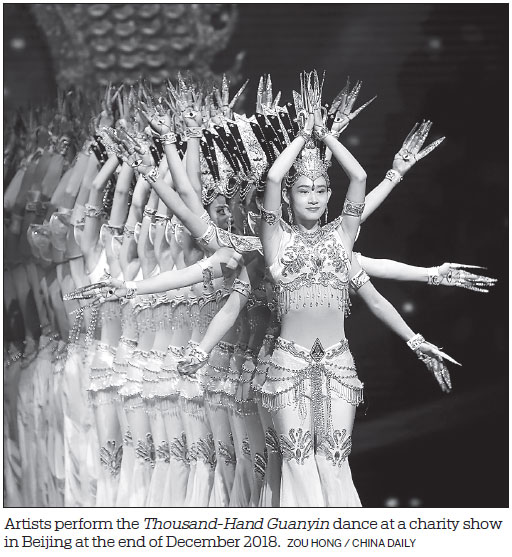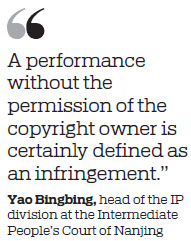Popular TV performance triggers copyright issue
A recent dance - the Thousand-Hand Guanyin performed by the Chinese actress Guan Xiaotong at a Zhejiang Television show - has been caught in an intellectual property dispute, provoking a public discussion about IP protection in China's film and television industry.
At a popular competitive reality show aired on Zhejiang Television on Feb 15, Guan, wearing a brilliant golden dress, performed the classic dance, together with the Heart Voice Disabled People's Art Troupe from Beijing.
One hour after the performance, the China Disabled People's Performing Art Troupe made an announcement in the wake of infringement on its copyright for Thousand-Hand Guanyin and emphasized that the dance was directed by Zhang Jigang, a well-known Chinese choreographer, not Mao Difang, who appeared in the subtitles on the screen.

The next day, Zhejiang Television apologized to the China Disabled People's Performing Art Troupe and explained it is Zhang who created the dance; Mao was simply responsible for the rehearsal.
As one of the most popular dances in China, Thousand-Hand Guanyin was first staged on the Spring Festival gala in 2005 and shot to fame overnight.
In 2006, Mao filed a copyright complaint with the Haidian District People's Court, claiming that the smash hit dance constituted "substantial similarity" with a dance she created before.
The court rejected plaintiff Mao's request. It recognized the copyright registration certificates concerning Thousand-Hand Guanyin, which were granted to the China Disabled People's Performing Art Troupe in 2005, as key evidence. They showed Zhang Jigang as the creator and the troupe as the copyright owner.
The ownership of copyright is a key criterion for judging whether a case qualifies as infringement or not, and it consists of specific rights such as directing, performing and spreading on the internet, Legal Daily quoted Yao Bingbing, head of the IP division at the Intermediate People's Court of Nanjing, as saying.
"A performance without the permission of the copyright owner is certainly defined as an infringement," Yao added.

Zhao Zhanling, a researcher of the intellectual property rights center at China University of Political Science and Law, told the Beijing-based newspaper that as Thousand-Hand Guanyin is one of the most popular stage dances in present-day China, many institutes or people would like to offer the performance.
But due to weak IP protection awareness or low costs for infringement, some of them have not been authorized by the copyright owner, Zhao said. "The creation of many literary and artistic works including dance is very difficult. Others should fully respect the intellectual property rights and obtain legal authorization in advance."
Qi Aimin, head of the Guangxi Development Research Institute of Intellectual Property, said that based on the current situation and the announcement made by Zhejiang Television, the case could be identified as an infringement.
"However, the infringement liability should not be magnified. Dancers involved including Guan are not liable."
Over the past few years, there were many TV variety shows that have been involved in copyright disputes, such as the 15-episode reality show The Coming One, produced and broadcast by Tencent Video, a streaming platform owned by internet giant Tencent, and Hunan Television's music competitive program Singer.
The television and movie industry should enhance IP awareness and establish a special department to prevent infringement risks, Qi said.
wangjinhui@chinadaily.com.cn
(China Daily 02/28/2019 page17)














